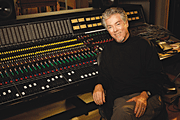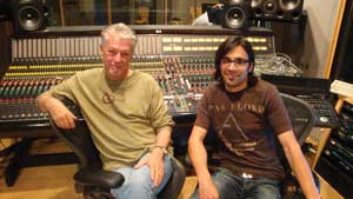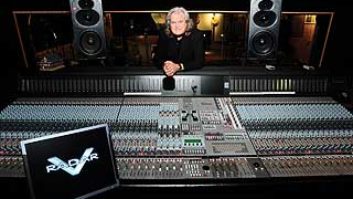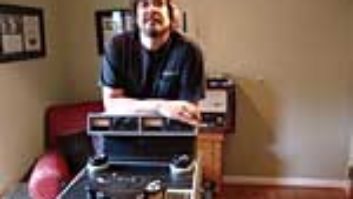
Producer, engineer and songwriter Brent Maher at The Blue Room
photo: Mark DeLong
Brent Maher’s business was growing, but expansion meant being in two different locations at once. His Berry Hill neighbor John McBride’s Blackbird Studio had grand renovation dreams and didn’t want to move. A fortuitous game of Nashville property-swapping commenced, whereby Maher took over management of The Blue Room, a well-loved facility nearby, and sold his former studio to McBride to be incorporated into Blackbird’s new four-room, four-star facility — leaving both studios winners.
After 20 years of providing independent publishing and music production to the region, Maher’s Moraine Music Group’s move to The Blue Room also marks the creation of its own record label. Especially convenient is that the record company’s offices are being built on a site “less than a 30-second walk” from The Blue Room, which will continue to be owned by Tom Fouce.
Maher already has an enviable track record in and around Nashville, from his early days engineering for Elvis and at Monument Records, his discovery of The Judds (for whom he’s produced, engineered and written hit songs) to producing/engineering for Wynonna, Nickel Creek, Jo Dee Messina and a host of country talent. Even with a chart-topping history, Moraine Music functions with an indie philosophy, working with a few artists a year and bringing them to a point where, “We feel that the artist is mature and we’ve done everything that we can do to let them step up on the big stage on every facet of the business. Not just walking up on the stage and singing, but dealing with the business aspect of the music business,” says Maher.
Helping Maher to “take the music to the streets” and facilitate an independent style of artist development and music production is a group of talented songwriters and young producers (Mark Selby, Brian Dean Maher, Billy Montana, Charles Yingling) and a range of new artists. Maher emphasizes the importance of his hands-on approach: “What I try to do with all of our artists is not to develop my sound; I’m trying to develop their sound. We try to find a musical identity that is as strong as the artist brings, as far as their writing and their vocal talents.” Currently on his roster are country artist Keni Thomas (Flags of Our Fathers), Jenai (Cool Me Down) and Sean Locke (Will of Desire).
As Maher’s group moves in and gets settled, The Blue Room’s projects will benefit from two studios’ worth of gear: Moraine Music is moving in its outboard collection, plus Maher’s 32-input/24-bus Sphere console, which Maher explains is “a very warm, natural-sounding board. The mic pre’s on it are just outstanding, and the EQ that the Sphere has is basically a graphic on every input so it [can have] an amazing amount of coloration.” Of Fouce’s Trident console, which resides in the studio, Maher says, “One of the reasons why I decided to move into The Blue Room is the tracks that we cut here previously at Moraine on the Sphere sounded marvelous coming through the Trident. The Trident, to my ears, is warm and has a lot of good punch, but with a little more edge.”
In addition to two consoles, Maher and second engineer Yingling will work with a TC Electronic M5000, Eventide Eclipse, Universal Audio LA-2A and dbx 160, with mics from AKG, Audio-Technica, Sennheiser and Neumann. While the studio isn’t set up for 5.1, it’s flush with Dynaudio Acoustics M-2 and Genelec 1031A monitors running through Hafler amps; recorders include Studer A827, iZ RADAR 24, Otari RADAR II and Alesis ML-9600.
Maher, who still acts as primary engineer on most of Moraine’s projects, prefers to hear a more organic sound and does his “best work getting those sounds and making the best out of it, so basically what ends up on tape will be the true character for what’s created on the floor. The last four albums I’ve mixed, I quit using automation. It’s absolutely the most fun; it’s a little maddening from time to time, but by and large, each mix is a performance. It’s a part of the process of not letting technology prevent you from letting go when you should let go.”
The songwriter in Maher can’t help but advocate that country’s music-makers consider the future of the genre in every artist they develop, sign and promote. For Maher, encouraging that unique voice in his artists and sending them out into the world while they’re at an inspirational peak is the ideal step for country music. As Maher summarizes, an artist “could easily sign a deal and be lucky to get that record out in a year or a year-and-a-half. Every artist that I know is writing something different today than they were six months ago. They’ve matured; they have a different viewpoint on life. We’re trying to create music that is the leading edge, as we speak. I’d love to see that as being a movement in Nashville.”
Breean Lingle is a Mix assistant editor.






